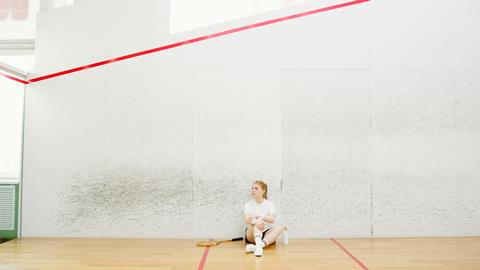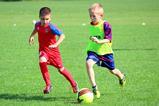In part two of his series on youth, children and sport, Jonny Reid helps Christian parents think about sport, identity and the love of God

In part one, we explored the beautiful truth that God made sport as a gift, a joy, and a way to reflect His creativity. But let’s be honest: that can feel idealistic. We don’t live in a perfect world. Sport, like life, involves disappointment—injustices, injuries, losses, and rejection. So how do we help our children thrive in that reality?
The problem: An achieved identity
Andre Agassi, one of the greatest tennis players of all time, tells a powerful story in his autobiography: “I’m seven years old… I whisper: Just quit, Andre, just give up… But I can’t. Not only would my father chase me around the house with my racket, but something in my gut… won’t let me. I hate tennis… and still, I keep playing… because I have no choice.”
By seven, Agassi had already tied his worth to performance. He didn’t play for joy but because of fear—fear of his father’s rage, of failure, of being unloved.
This story isn’t unique. In sport, disappointment is inevitable. The question is: when it comes, what will our children believe about themselves? Will they feel safe, loved, and secure?
The truth is, sport makes a terrible god. If identity is built on winning or performing, it will eventually crush us. Sport constantly asks, “Are you good enough?”—and then compares, ranks, and judges.
Let’s raise children who play with joy and compete with freedom, not fear
Even the best athletes face this. England rugby legend Jonny Wilkinson once said: “It feels as if I spent years trying to fight depression with another title… another point. It’s never enough.”
That’s the danger of an achieved identity: it’s never safe—whether in defeat or in victory. As parents, we need to help our children build their identity on something deeper than sport.
Sometimes even Christian children may think:
- “Did I do something wrong spiritually that made me lose?”
- “If God loved me, why did I get injured?”
These thoughts reveal a performance-based faith. In moments of both triumph and failure, we must help our kids lean into the security of their identity in Christ.
This isn’t just about our children—it’s about us. A former elite athlete once shared how her parents’ love seemed dependent on her success: “I felt loved when I was winning. So, in the end, I performed in order to feel accepted.”
We might never say that out loud, but it’s worth asking: Does my child feel more loved when they perform well? Does their success boost my sense of worth?
The solution: A received identity
The gospel offers something radically different: in Christ, our identity isn’t earned—it’s received.
Paul says in Ephesians 5:1: “Be imitators of God, therefore, as dearly loved children.”
We’re not performers trying to impress a distant coach. We’re children—deeply loved. God isn’t watching from the stands, clipboard in hand, ready to critique. He’s present on the pitch, walking with us through every setback and success.
Read more on sport and faith:
Why God invented the game: Five faith‑filled reasons sport matters to your family
Should you let your child play sport on Sunday?
Helping your child’s faith when they are passionate about their sport
The next Messi or Ronaldo? How to support your child’s elite sports ambitions as a Christian parent
The result: competing with joy and security
Olympic high jumper Nicola McDermott expressed it perfectly: “When your identity is based on performance, it will never satisfy. But when it’s based on being loved by God… it allows me to perform with joy and freedom.”
That’s the invitation—for our children and for us. To live and play from a place of joy and security, not fear or pressure.
So how do we respond when sport brings tears, injuries, or frustration?
Start with simple, gentle questions:
- “Do you know how God feels about you right now, even though you lost?”
- “Where is God as you recover from this injury?”
- “What does your performance say about you? And what does Jesus say?”
We point them to the cross—proof of God’s unshakable love. Jesus died and rose again not because we were performing well, but because we needed rescuing. That’s how secure our identity is in him.
Let’s nurture young people who know that their greatest victory has already been won on the cross—and whose identity is secure
When disappointment comes, it’s not a sign that God is distant—it’s an opportunity to be reminded of His closeness. Hebrews tells us, “The Lord disciplines the one He loves.” That doesn’t always mean punishment—it means He is involved. He may withhold what we want, but He never withholds His love.
God promises to work all things—even pain—for our good (Romans 8:28). That doesn’t mean everything is good. Setbacks, deselection, injury—these are real and hard. But they remind us that this world is not as it should be.
Yet even those painful moments can point us to something greater. They help us detach our identity from performance and fix it on Christ. They stir our longing for a better world—one with no more loss, sickness, or pain.
And through these trials, God is shaping us to become more like Jesus. He’s making us courageous, kind, joyful, faithful. That kind of character lasts far longer than any medal.
For the competitive among us, this might be hard to hear—but God’s greatest goal isn’t our sporting success. It’s that we keep trusting Christ and becoming more like Him.
A tale of two fathers
Andre Agassi’s father drove him through fear. His identity was burdened by performance.
But contrast that with Olympic swimmer Chad Le Clos’s father. After his son won gold in 2012, cameras caught him beaming with joy: “Look at my boy! He’s so beautiful!”
It wasn’t about the medal—it was about love, pure delight in his son.
And that’s a glimpse of how our heavenly Father sees us. Through Jesus, God looks at us and says: “Look at my child. They’re mine. They’re so loved.”
So next time your child walks off the pitch with tears in their eyes—or even with a trophy in their hands—remind them:
- They have nothing to prove to God.
- No victory will make Him love them more.
- No defeat will make Him love them less.
Let’s raise children who play with joy and compete with freedom, not fear. Let’s nurture young people who know that their greatest victory has already been won on the cross—and whose identity is secure, not in how they perform, but in who they belong to.


































